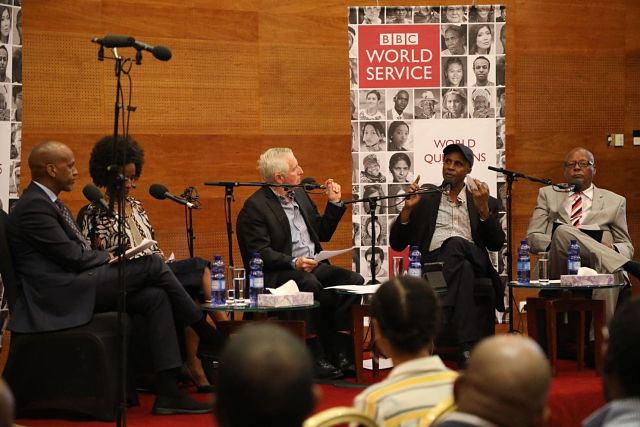 Whether it was ruled by an aging emperor, Soviet-backed army officers or former rebels, Ethiopia was rarely a place where you could criticize leaders so openly. Until last year, there were dozens of journalists and opposition politicians in jail or exile. (Photo: Ethiopian activist Eskinder Nega (2nd right) answered questions from BBC presenter Jonathan Dimbleby (center) at BBC's World Questions program held in Addis Ababa on Monday. The other panelists from left include Mustafa Omar, president of the Somali Region, Tsedale Lemma, editor of the Addis Standard and on the far right academic Merera Gudina. (Henock Birhanu/BBC)
Whether it was ruled by an aging emperor, Soviet-backed army officers or former rebels, Ethiopia was rarely a place where you could criticize leaders so openly. Until last year, there were dozens of journalists and opposition politicians in jail or exile. (Photo: Ethiopian activist Eskinder Nega (2nd right) answered questions from BBC presenter Jonathan Dimbleby (center) at BBC's World Questions program held in Addis Ababa on Monday. The other panelists from left include Mustafa Omar, president of the Somali Region, Tsedale Lemma, editor of the Addis Standard and on the far right academic Merera Gudina. (Henock Birhanu/BBC)
The Washington Post
‘We don’t want another messiah’: Newly vocal Ethiopians debate an uncertain future
In a scene that would have been unimaginable just a year ago, some 200 Ethiopians in the capital debated their country’s politics, economics and expressed their fears over the rise in ethnic violence.
The BBC’s “World Questions” current events program came to Addis Ababa on Monday demonstrating how much freedom of expression has changed in Africa’s second-most populous nation.
After decades of authoritarian governments that tightly controlled the press, the new reformist Prime Minister Abiy Ahmed has transformed the country by taking the shackles off the media and promising wide-ranging reforms.
But the loosening of such restrictions in Ethiopia has been accompanied by an explosion of ethnic conflict in the countryside. Millions of people have been displaced as long-simmering disputes over land boil to the surface — and as Monday’s discussion showed, people are frightened. Just in the week before the show, there were reports of tit-for-tat massacres between the Amhara and Gumuz peoples in the northern part of the country that killed dozens.
“I used to be afraid of the government; now I’m afraid of the people,” said one audience member, citing a common concern over the rise in lawlessness. “Before it was dictatorship we were afraid of; now it’s about the [lack] of rule of law.”
The prime minister himself was not spared criticism, either, with some singling him out for the speed and what they called the recklessness of his reforms and a personal style of leadership that often bypasses the country’s institutions.
“I believe that Dr. Abiy is a problem because we want a systematic change that can sustain itself whether there is a messiah or not,” said one man. “We don’t want another messiah.”
Whether it was ruled by an aging emperor, Soviet-backed army officers or former rebels, Ethiopia was rarely a place where you could criticize leaders so openly. Until last year, there were dozens of journalists and opposition politicians in jail or exile.
—
Related:
Spotlight: Voice of America’s Negussie Mengesha on New Media Freedoms in Ethiopia
After years of repression, Ethiopia’s media is free — and fanning the flames of ethnic tension
World Press Freedom Day events raise alarm on fake news (AP)
Ethiopian Selected as Official Carrier for 2019 World Press Freedom Day
Tadias Reflection on PM Abiy’s One Year in Office
Join the conversation on Twitter and Facebook.

























